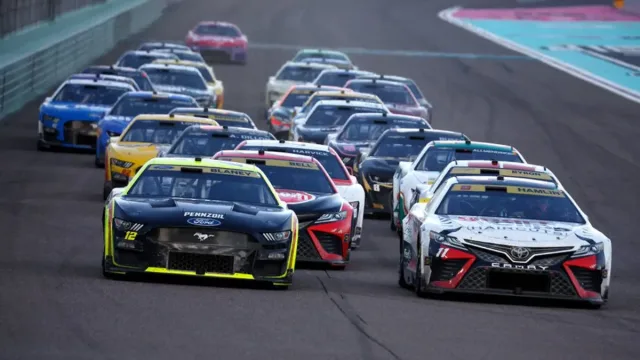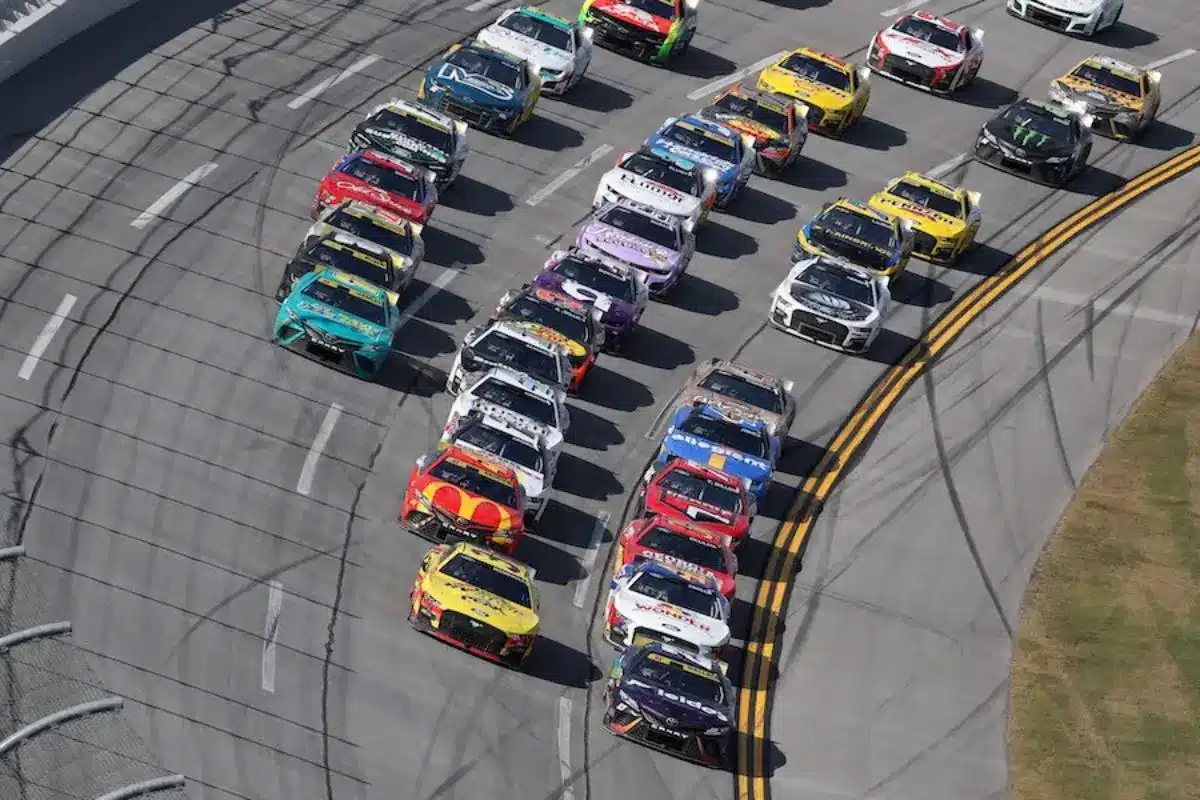Recent claims about NASCAR favoring chevrolet/”>Chevrolet have sparked a big debate about fairness in the playoffs. Important events, like Christopher Bell getting disqualified from the NASCAR Championship 4 for a last-lap move, show some confusing rule enforcement. Many fans and drivers feel there is unfair treatment toward Chevrolet drivers, especially during key moments in races. These allegations are making people worried and unsure about the trustworthiness of NASCAR and how it handles its rules.
Key Highlights
- Allegations of favoritism towards Chevrolet drivers have intensified following Christopher Bell’s disqualification from the NASCAR Championship 4.
- NASCAR’s inconsistent rule enforcement has raised concerns about fairness and integrity among fans and competitors.
- The timing of penalties during NASCAR playoffs has led to questions about NASCAR’s commitment to equitable competition.
- Reports of Chevrolet drivers being instructed to avoid overtaking teammates contribute to suspicions of race manipulation.
- Stakeholders worry that perceived biases could diminish fan engagement and sponsorship support in NASCAR.
Controversial Conclusion of the Xfinity 500
What factors contributed to the controversial resolution of the Xfinity 500 at Martinsville? The race, held on November 3, 2024, culminated in a contentious ruling that eliminated Christopher Bell from the NASCAR Championship 4 due to a last-lap maneuver deemed inappropriate by NASCAR officials. This decision sparked widespread debate within the motorsports community, particularly regarding the perceived biases of NASCAR’s officiating.
Austin Konsenski, a noted NASCAR reporter, highlighted the apparent inconsistency in the officials’ judgment, suggesting a preferential treatment towards Chevrolet—a narrative that has gained traction among fans and analysts similarly. Konsenski’s assertion that officials overlooked possible race manipulation by Chevrolet raises critical questions about the integrity of the sport.
The circumstances surrounding Bell’s disqualification appear to contradict the governing body’s responsibility to guarantee fair competition. Additionally, the timing of the ruling—occurring during a NASCAR playoff scenario—intensified scrutiny over NASCAR’s decision-making processes. Critics argue that such rulings should be applied uniformly, regardless of the manufacturer involved, to maintain the sport’s credibility.
The Debate on Race Manipulation
While NASCAR has long been celebrated for its thrilling competition, recent incidents, particularly during the Xfinity 500, have ignited a fervent debate surrounding race manipulation and the integrity of officiating. The alarming disclosure that Chevrolet drivers were instructed to refrain from overtaking their teammate, William Byron, raises serious questions about the fairness of the competition. Such actions suggest a troubling preferential treatment that undermines the very essence of racing.
The implications of this race manipulation resonate deeply within the NASCAR community:
- Erosion of Trust: Fans and competitors similarly may begin to view NASCAR as a league that prioritizes specific manufacturers over fair competition, fundamentally altering their perception of the sport.
- Impact on Competitive Balance: If certain teams are afforded leniency while others face penalties, it disrupts the competitive equilibrium that is vital for fostering excitement and unpredictability in racing.
- Long-term Consequences: Persistent favoritism could lead to dwindling fan engagement and sponsorships, as stakeholders may question the integrity of a sport that appears rigged in favor of a singular entity.
As insiders like Konsenski note, the failure to penalize Chevrolet drivers for orchestrating race outcomes not only jeopardizes the integrity of the playoffs but also poses a notable risk to NASCAR’s legacy.
“NASCAR looks very biased toward Chevrolet in this entire process. You can’t penalize one side and not penalize the other. Whether it’s 3 drivers in the championship or Kyle Larson added, I’m not sure how Chevrolet’s race manipulation is ignored. Something needs to be done.” – Austin Konsenski
The sport must address these concerns with transparency and accountability to restore faith among its fan base and maintain the competitive spirit that has defined it for decades.
Christopher Bell’s Penalty Explained
Examining Christopher Bell’s recent penalty reveals a clear contrast in how NASCAR enforces its rules across different teams and drivers. Bell’s situation exemplifies the complexities and perceived inconsistencies in NASCAR’s officiating, particularly regarding team dynamics and competitive fairness. During the race, Bell benefited from a tactical move by his Toyota teammate, Bubba Wallace, who slowed down to assist him. This act was intended to help Bell secure a competitive position. However, in a dramatic turn of events, Bell executed a controversial action known as the “Hail Melon” on the final lap to surpass Wallace, finishing in P18.
Despite this finish initially allowing Bell to secure his place in the Championship 4, NASCAR’s ensuing penalty stripped him of that position, relegating him to P22. This decision has sparked discussions on whether the enforcement of rules is applied uniformly across teams, particularly when juxtaposed with Chevrolet drivers who have faced fewer repercussions for similar tactics.
NASCAR’s Justification for the Penalty
Amidst the fallout from the Xfinity 500 race, NASCAR’s justification for penalizing Christopher Bell has raised critical questions about the consistency and fairness of rule enforcement.
In a post-race analysis, NASCAR VP Elton Sawyer emphasized the focus on Bell’s actions during the final lap, stating that his maneuvering violated established guidelines. However, this rationale begs a deeper examination of the sanctioning body’s commitment to impartiality, especially given the absence of penalties for competing Chevy drivers engaged in comparable infractions.
“If you look at the other situations that were going, #23, the cars behind the #24, really no bearing at this time. We’ll look at those at a later time.”
“Like I said, the main focus for us in the tower, when the situation happened, was focusing on the 20 car. Let’s figure out where are we at there. To me and our team there was focus more on that than the other stuff. The other stuff was there; don’t get me wrong. The 20 rose to the level that, We got to figure this one out pretty quick.” – Elton Sawyer
The implications of this penalty are profound, as they effectively extinguished Bell’s aspirations of competing for the championship title. The justification provided by NASCAR reflects a selective enforcement that can be perceived as favoritism toward specific teams.
This situation evokes strong emotions among fans and stakeholders as they grapple with the following concerns:
- Integrity: Is NASCAR maintaining the integrity of the sport by enforcing rules uniformly across all teams?
- Accountability: Why are certain infractions overlooked while others result in severe consequences?
- Equity: Are all drivers afforded the same opportunities, or are some unfairly disadvantaged in the pursuit of the championship?
News in Brief: Insider Discloses NASCAR’s Favoritism for Chevrolet
The allegations of favoritism within NASCAR, particularly towards Chevrolet, raise considerable concerns regarding the integrity of the playoff system. The controversial outcome of the Xfinity 500 and the subsequent penalties imposed on drivers such as Christopher Bell highlight potential inconsistencies in race officiating.
NASCAR’s justification for these penalties must be scrutinized to guarantee fairness and transparency. Ultimately, the ongoing debate over race manipulation could undermine public trust in the sport, demanding a critical examination of current practices and policies.
ALSO READ: Chevy Caught in the Act: Inside NASCAR’s Manufacturer Cheating Controversy!



